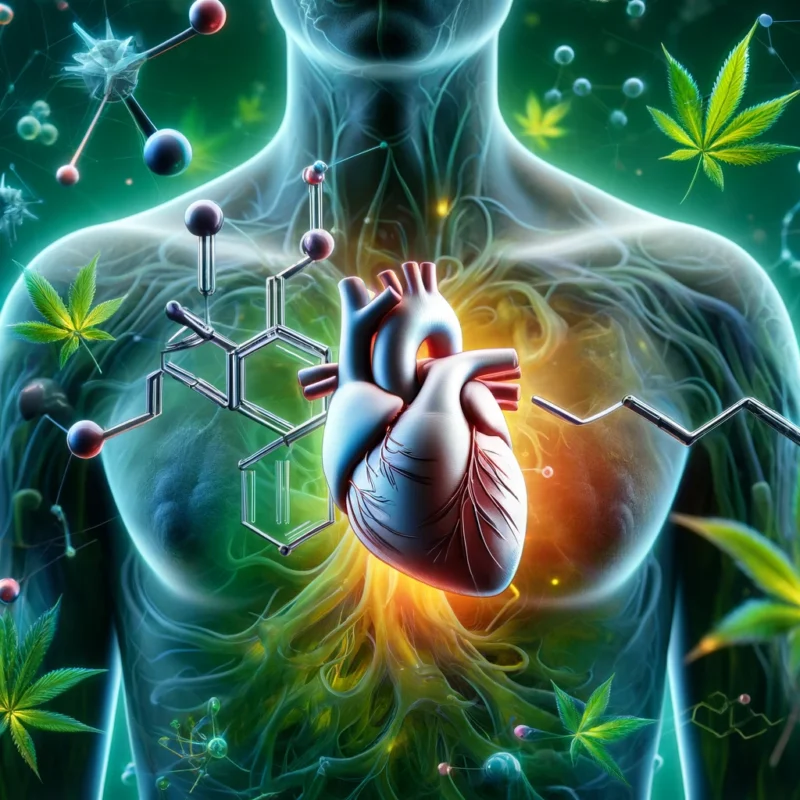Hemp and Cardiovascular Health: What Science Says
Introduction: Hemp, scientifically known as Cannabis sativa, has been utilized by humanity for millennia across various industries, from medicine to textiles. In recent decades, interest in its potential therapeutic properties has skyrocketed, prompting the scientific community to explore how this plant affects various aspects of human health, including cardiovascular health. But what does the science say about this fascinating and complex topic?
Understanding Hemp and Its Components
To understand hemp’s impact on cardiovascular health, it’s essential to know its key components. Hemp contains over 100 active chemical compounds known as cannabinoids, with the most well-known being cannabidiol (CBD) and tetrahydrocannabinol (THC).
-
Cannabidiol (CBD):
CBD is a non-psychoactive cannabinoid that has garnered attention for its potential therapeutic properties. Preliminary studies suggest that CBD may have antioxidant, anti-inflammatory, and neuroprotective effects, making it a promising candidate for treating various medical conditions. -
Tetrahydrocannabinol (THC):
THC is the main psychoactive component of hemp, responsible for the intoxicating effects associated with cannabis use. Beyond its effects on the central nervous system, THC can also influence the cardiovascular system, with outcomes that vary based on dosage and usage frequency.
Mechanisms of Action on Cardiovascular Health
The interaction between cannabinoids and the human endocannabinoid system underpins their effects on the heart and blood vessels. This system comprises receptors, enzymes, and endocannabinoids that regulate various vital physiological functions.
-
Endocannabinoid System and Receptors:
The primary receptors in the endocannabinoid system are CB1 and CB2 receptors. CB1 receptors are predominantly found in the central and peripheral nervous systems, while CB2 receptors are mainly located in immune cells.- CB1 Receptor: Activation can influence heart rate, blood pressure, and myocardial contractility.
- CB2 Receptor: It plays a role in modulating the inflammatory response and may have protective effects on cardiac tissue.
Effects of CBD on the Heart
CBD interacts with the endocannabinoid system in a complex way. It doesn’t directly bind to CB1 or CB2 receptors but modulates their activity while affecting other receptors like TRPV1 and PPAR-γ.
- Antioxidant Action:
CBD can reduce oxidative stress, a key factor in the development of cardiovascular diseases like atherosclerosis. - Anti-inflammatory Effects:
By reducing inflammation, CBD may prevent damage to blood vessels and the myocardium. - Blood Pressure Modulation:
Some studies indicate that CBD can help lower blood pressure in stressful situations by improving vasodilation.
Effects of THC on the Heart
THC has a higher affinity for CB1 receptors, which can lead to more pronounced cardiovascular effects.
- Increased Heart Rate:
THC can cause tachycardia, increasing the workload on the heart. - Blood Pressure Variations:
THC may cause orthostatic hypotension or, conversely, hypertension, depending on individual conditions. - Risk of Arrhythmias:
In predisposed individuals, THC use may increase the risk of cardiac arrhythmias, which can be potentially dangerous.
Scientific Studies and Findings
Preclinical Research
Animal studies have provided valuable insights into the potential cardioprotective effects of CBD.
- Reduction of Ischemia/Reperfusion Injury:
In models of myocardial infarction, CBD has been shown to reduce tissue damage, improving functional recovery. - Effects on Atherosclerosis:
CBD may inhibit the proliferation of vascular smooth muscle cells, a key process in the development of atherosclerosis. - Protection from Oxidative Stress:
CBD has been shown to increase antioxidant enzyme activity, protecting the heart from free radical damage.
Clinical Studies on Humans
While clinical research on humans is still limited, it offers intriguing insights.
- Blood Pressure:
A study published in the Journal of Clinical Investigation highlighted that a single dose of CBD could reduce resting blood pressure and stress-induced blood pressure spikes. - Anxiety and Stress:
Since stress is a risk factor for cardiovascular diseases, the anxiolytic effects of CBD may indirectly benefit heart health. - THC-Related Risks:
Some studies have linked cannabis use with high THC content to an increased risk of myocardial infarction, particularly in young adults.
Potential Risks
- Pharmacological Interactions:
CBD can affect the metabolism of cardiovascular drugs like beta-blockers and anticoagulants, altering their efficacy. - Chronic THC Use:
Prolonged THC use has been associated with structural changes in the heart and blood vessels, although evidence is still preliminary. - At-Risk Populations:
Individuals with conditions like hypertension, angina, or heart failure should exercise caution.
Considerations for Hemp Use
Dosage and Administration
Dosage and method of administration significantly impact the effects of CBD and THC.
- Oral CBD Intake:
Provides a slower, more sustained release, with longer-lasting but less intense effects. - THC Inhalation:
Leads to rapid absorption, with immediate effects that may pose more risks to the heart. - Balanced Products:
Some products contain a balanced ratio of CBD and THC, potentially moderating overall effects.
Interactions with Other Medications
CBD and THC can interact with liver enzymes, such as those in the cytochrome P450 family, altering the metabolism of various drugs.
- Enzyme Inhibition:
CBD may inhibit enzymes like CYP3A4 and CYP2D6, affecting drugs like statins and antiarrhythmics. - Potential Side Effects:
These interactions can increase the risk of side effects or reduce the therapeutic efficacy of medications.
Regulation and Product Quality
-
Current Regulations:
In Italy, CBD is legal as long as the THC content is below 0.6%. However, regulations can change, so it’s essential to stay informed. -
Quality Importance:
Look for products tested by independent laboratories to ensure purity and the declared concentration of cannabinoids.Conclusion: The relationship between hemp and cardiovascular health is a rapidly evolving field of research, full of potential but also uncertainties. While CBD shows promise as a cardioprotective agent, THC presents risks that must be considered.
-
CBD as a Cardioprotective Agent:
Potential benefits due to its antioxidant and anti-inflammatory properties. -
THC and Cardiovascular Risks:
Possible increased risk of adverse events, especially in predisposed individuals. -
Need for Further Studies:
More large-scale clinical studies are needed to confirm these findings. -
Personalized Approach:
Decisions about hemp use should be made in collaboration with healthcare professionals.
In conclusion, while hemp offers interesting prospects in the field of cardiovascular health, it is essential to proceed with caution, relying on solid scientific evidence and appropriate medical advice.
Pubblicità
🧠 Prova il Ribaltatore
Ribalta questa frase proibizionista con l'AI e scopri l'ironia dietro lo slogan.
Ribalta "Hemp and Cardiovascular Health..."🔍 Frasi Correlate
Cerca altre frasi e contenuti su questo tema nel nostro archivio.
Cerca "Cannabis news"Supporta Canapalandia
Se questo contenuto ti è stato utile, puoi sostenerci: ci aiuta a mantenere il progetto indipendente e aggiornato.






